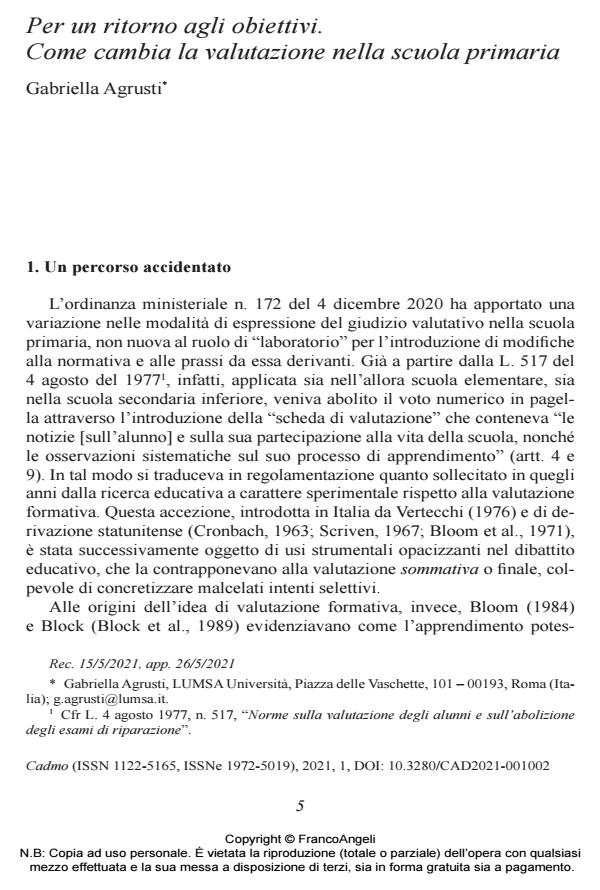Back to learning outcomes. Changes in primary school assessment
Journal title CADMO
Author/s Gabriella Agrusti
Publishing Year 2021 Issue 2021/1
Language Italian Pages 16 P. 5-20 File size 221 KB
DOI 10.3280/CAD2021-001002
DOI is like a bar code for intellectual property: to have more infomation
click here
Below, you can see the article first page
If you want to buy this article in PDF format, you can do it, following the instructions to buy download credits

FrancoAngeli is member of Publishers International Linking Association, Inc (PILA), a not-for-profit association which run the CrossRef service enabling links to and from online scholarly content.
Recent changes in Italian regulations on how to express primary school students’ assessment results led to a reconsideration of the role of learning outcomes. The study offers an overview of the main innovations introduced and the results of a set of trials carried out with a sample of over 800 primary school teachers on the correct formulation of learning outcomes. Among the main mistakes in selecting representative learning outcomes, there is the con¬fusion between educational goals and observable instructional objectives, the use of verbs that require further clarifications either or the reference to too specific formulations, essentially reproducing the assessment task level.
Keywords: primary school, Italy, assessment, learning outcomes, teachers’ professional development.
- Anderson, L.W., Krathwohl D.R. (Eds) (2001), A taxonomy for learning teaching and assessing: a revision of Bloom’s taxonomy of educational objectives. New York: Longman.
- Black, P., Wiliam, D. (2010), “Inside the Black Box: Raising Standards through Classroom Assessment”, Phi Delta Kappan, 92 (1), pp. 81-90.
- Block, J.H. (Ed) (1971), Mastery learning. Theory and Practice. New York: Holt, Rinehart and Winston; tr. it. Mastery learning. Procedimenti scientifici di educa zione individualizzata. Torino: Loescher, 1975.
- Block, J.H., Efthim, H.E., Burns, R.B. (1989), Building effective mastery learning schools. New York: Longman.
- Bloom, B.S. (1956), Taxonomy of Educational objectives, Handbook I: Cognitive Domain. New York: McKay.
- Bloom, B.S. (1984), “The search for methods of group instruction as effective as one to-one tutoring”, Educational Leadership, 41 (8), pp. 4-17.
- Bloom, B.S., Hastings, J.T., Madaus, G. (1971), Handbook on formative and sum mative evaluation of student learning. New York: McGraw-Hill.
- Brookhart, S., Nitko, A. (2008), Assessment and Grading in Classrooms. Upper Sad dle River (NJ): Pearson Merrill Prentice Hall.
- Cronbach, L. (1963). “Course improvement through evaluation”, Teachers College Record, 64 (8), pp. 672-683.
- Ferrari, M., Morandi, M., Falanga, M. (2018), Valutazione scolastica. Il concetto, la storia, la norma. Brescia: ELS La Scuola.
- Fuchs, L.S., Fuchs, D. (1986), “Effects of Systematic Formative Evaluation: A Me ta-Analysis”, Exceptional Children, 53 (3), November, pp. 199-208.
- Guilford J.P., Fruchter, B. (1977), Fundamental Statistics in Psychology and Educa tion. New York: McGraw-Hill Book Co.
- Hattie, J., Timperley, H. (2007), “The power of feedback”, Review of Educational Research, 77 (1), pp. 81-112.
- Mager, R. (1984), Gli obiettivi didattici, Teramo: Giunti e Lisciani.
- Scriven, M. (1967), Methodology of evaluation. In R. Tyler, R. Gagnè, M. Scriven (Eds), Perspectives of Curriculum Development. Chicago (IL): Rand, McNally & Co.
- Vertecchi, B. (1976), Valutazione formativa. Torino: Loescher.
- Vertecchi, B. (1993), Decisione didattica e valutazione. Firenze: La Nuova Italia.
- Vertecchi, B. (2003), Manuale della valutazione. Analisi degli apprendimenti e dei contesti. Milano: FrancoAngeli.
- Vertecchi, B. (2012), Parole per la scuola. Milano: FrancoAngeli.
- Vertecchi, B., Agrusti, G., Losito, B. (2010), Origini e sviluppi della ricerca valuta tiva, Milano: FrancoAngeli.
- Zanniello, G. (2011), Dagli obiettivi educativi alle competenze fondamentali, Paler mo: Palumbo.
- La valutazione incompresa: un'indagine esplorativa sul nuovo approccio criteriale alla valutazione periodica e finale nella scuola primaria Andrea Ciani, Alessandra Rosa, in CADMO 2/2024 pp.59
DOI: 10.3280/CAD2023-002005
Gabriella Agrusti, Per un ritorno agli obiettivi. Come cambia la valutazione nella scuola primaria in "CADMO" 1/2021, pp 5-20, DOI: 10.3280/CAD2021-001002